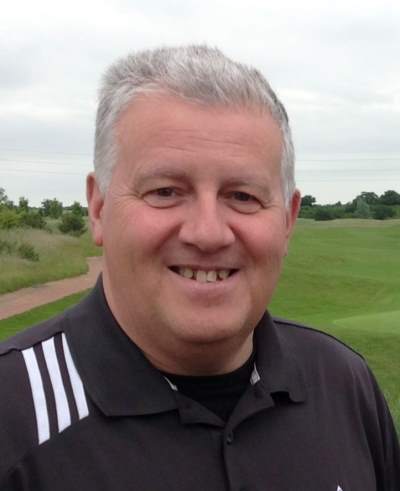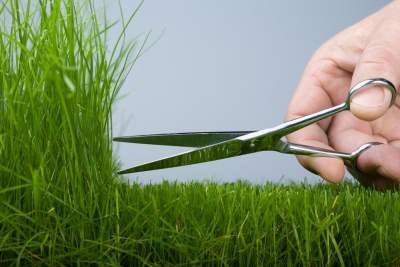Golf Business International member Paul Copsey is managing director at Turf Machinery Acquisitions, and has many years’ experience and expertise in the specifying, negotiating and purchasing of turf equipment. Golf Business News joined him for a chat …
You’ve been involved with the golf industry for more than 40 years, in various roles – what are the biggest differences and changes you’ve noticed in that time, for good and bad?

I think the key word there was in the question; we now accept it as an “industry”, whereas 40 years ago it was more of a “game”, even in the way in which clubs and courses were run could now be viewed as a little amateurish. In a way they did not need to be any more, as things like costs, expectations and incomes were so much lower.
I sometimes find it hard to reconcile my early days as a greenkeeper, working either on my own or with an assistant at a little nine-hole club (with a very limited budget, machinery and materials), to a point where I had to help write the business plan for a proprietary-owned 54-hole golf facility with a keen eye for profit and loss in the millions, based on quality and service; then on to administering and managing the course maintenance function for the equivalent of 55 18-hole golf courses for a large operating group. It does make me wonder sometimes, ‘how did I get from there to there?’
Reflecting on that answer, do you think there were any key aspects in the progression to where we are now?
Any industry trying to deal with evolutionary success always faces growing pains and new challenges. The boom in participation in the late 70s and 80s, fuelled by the TV exposure of the great golfing champions from the US and then European and home-grown talent, started cranking up the pressure. Those coming to the game wanted their course to look like they did on TV, and they wanted it every day of the week. From the greenkeeping side, that put us on the road to driving higher standards, producing this consistently and the need for more manpower, machinery, materials etc. Off the course, golfers turned into “customers”, wanting better food and beverage offerings, but also playing equipment and apparel.
If we take a look at our UK market, perhaps even a global view, this surge in demand did open the flood gates for some pretty ill-advised and poorly located new golf courses – bigger, better, ‘championship’ courses seemed to be popping up everywhere. While it would be too easy to say this oversupply had a negative effect on the business, it has helped focus the mind for quality and efficiency, customer service and more inclusivity in the game for juniors and female golfers.
What is the biggest – or most difficult – career decision you’ve made?
Probably switching out of golf course management and into education. I just needed something new, a little more local and a different challenge. Helping tutor and mentor young greenkeepers and grounds personnel was very rewarding. The remuneration was not great, but you do really learn as much from your students and their facilities as you hope you are delivering to them. It was also a complete lifestyle change.
What are you working on now?
I was lucky that my educational role for a college allowed me to devote some time to other interests. I suppose firstly with another education role, I am the lead end-point assessor with City & Guilds for the new ‘Golf Greenkeeping Apprenticeship Standard’ developed by GTC and BIGGA. Having a key role in shaping the progression of our next generation of greenkeepers is quite daunting, but key for the future.
Also, by accident I fell into golf course consultancy work for agronomy and course management. I was being contacted by former colleagues and acquaintances to help with improving the standards of their courses, but perhaps, more importantly, how they could do this by being efficient, looking at how they organised their teams, could employ a management strategy and be much more professional in their approach to purchasing maintenance products and machinery.
 In a way, this is where Turf Machinery Acquisitions was born. Golf course machinery comes with big bills, from purchasing through to operations, so helping customers get this right and thinking differently about the topic can deliver them great financial savings.
In a way, this is where Turf Machinery Acquisitions was born. Golf course machinery comes with big bills, from purchasing through to operations, so helping customers get this right and thinking differently about the topic can deliver them great financial savings.
I must admit, though, that the greenkeeping bug has come back as well, so I will soon be taking on a role as a course manager again – I am pretty excited about the prospect, but at the same time a little nervous.
Which of the many services available with Golf Business International have impressed you the most and why?
For me it is the knowledge, skills and diversity of the members. There are just so many elements for a golf course or project that need to be right and contribute to the success of the whole. Each member is an expert in their own field and it is great to have the opportunity to learn from colleagues.
Everyone is very approachable, helpful and giving of their own time. I am proud to be a member and believe that Golf Business International offers a very significant wealth of experience and guidance for clubs, courses, existing and future golf projects.
What changes would you make to the game of golf – and why?
We are perhaps now seeing the changes that I have for many years wanted to see – such as more accessible facilities, fewer barriers for juniors, female golfers and dress codes disappearing, shorter game formats, less stroke play and more Stableford or matchplay events.
If there was one thing that probably does put me in a minority of one, however, it would be my argument some years ago for a limit to be placed on golf ball and club technology. I think there is too much emphasis on distance and almost bashing the ball as far as it will go. This has obviously cost the game millions in terms of having to lengthen courses, but also perhaps has led to more environmental pressure – for the less skilled that 300-yard drive that does not go straight, just goes further right or left putting pressure on clearing and cutting down rough in the name of avoidance of ‘slow play’, or just purely courses out-growing their boundaries and causing safety issues.
Personally, I would like to see less focus on distance and more on skill and shot-making. It was always a game of not how, but how many.
What or whom has provided the best memories for you in your career?
 I have been very lucky to travel, work and play in the US, South Africa, Europe and the UK. You learn so much doing this, picking up snippets of information, ideas, and techniques that you can store and use later. I think also, as I get older, I also value more the times and opportunities that I had to discuss and learn greenkeeping from the older greenkeepers of past generations when I was a very young assistant.
I have been very lucky to travel, work and play in the US, South Africa, Europe and the UK. You learn so much doing this, picking up snippets of information, ideas, and techniques that you can store and use later. I think also, as I get older, I also value more the times and opportunities that I had to discuss and learn greenkeeping from the older greenkeepers of past generations when I was a very young assistant.
Often, the solutions to some of today’s problems can be found in the past, especially agronomic issues. In this day and age, it is all too easy to dismiss what went before and rely on our modern technology or a new gimmick. “Back to the future” is perhaps an apt summary for modern greenkeeping.
Golf Business International – a ‘preferred partner’ of England Golf – is unique in its ability to make available a team of highly respected and experienced golf industry professionals to deal with any aspect of the business of golf through from conception to end. Golf Business International members can offer specialist skills in any number of aspects of golf operations, including buying, selling and financing golf developments; golf marketing and media relations; designing and building golf courses and driving ranges; environmental golf development; golf market research; and much more.
Paul Copsey is managing director of Turf Machinery Acquisitions LLP and a member of Golf Business international. He was, for many years, the senior buyer of equipment and materials for American Golf (UK Ltd) and then Crown Golf, two of the largest multi-course owners of golf courses in the UK and Europe. As regional and group courses manager, he directed the agronomic planning and golf course management practices across all of the golf courses, maintained a direct daily input at selected clubs as well as being a member of the company’s executive management team. With 40 years’ experience in golf course maintenance, turf agronomy, general management, golf course acquisitions and golf business planning, he has significant experience and expertise in the specifying, negotiating and purchasing of turf equipment.
Turf Machinery Acquisitions was founded by Paul Copsey in 2017 in response to the need in the golf industry for greater efficiency and a more formalised structure for the purchasing of machinery. The company works as a consultant partner to ensure that golf courses and clubs purchase the equipment they need at the best price.
Turf Machinery Acquisitions www.turfmachineryacquisitions.co.uk

